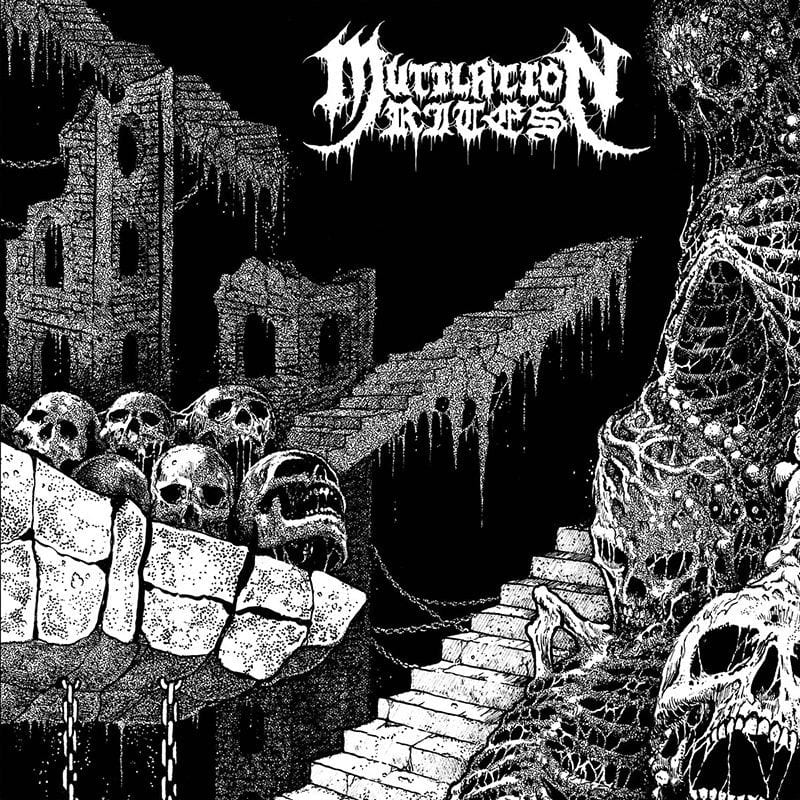
Chasm, the third full-length by Brooklyn-based black metal foursome Mutilation Rites, is a peculiar yet in retrospect quite obvious step in the band’s evolution. While their previous release, 2014’s Harbinger, already saw the group move away from the simple, nostalgia-tinged style indebted to heroes of early Norwegian black metal like Darkthrone and towards a motley approach, it’s on Chasm that this break from tradition becomes complete. Here Mutilation Rites leave the comforting asylum of black metal to embrace death, thrash, crust, and even progressive incursions.
True to their refined formula, the album starts with an unexpectedly fierce charge. The first strokes of “Pierced Larynx” are propelled forward by a prime selection of bits and pieces from the cookbook of brutal death metal and by Tyler Colburn’s incisive drumming. The song, which soon settles into a stead of crepitating riffs and groove sustained by George Paul and Michael Dimmitt’s exemplary guitar work, is a fitting showcase of Chasm‘s strengths and Mutilation Rites’ prowess at genre recombination. In contrast to the comparatively straightforward cuts found on Harbinger, “Pierced Larynx” is intricate and jagged, performed with immediacy and a vigorous conviction. It nonetheless remains stylistically varied and dulcet as biting tremolos clash with staccatos and blazingly fast, grindcore-like sections intertwine with black metal lulls.
From a distance, the album’s sonic tapestry appears chaotic and densely layered as the band toys with tropes from various extreme styles, stretching them out into an infinite snake, and compacting them back again to produce a mesmerizing effect. In the midst of this maelstrom, Paul’s vocals alternate between a bottomless guttural growl and a lighter, angrier shriek that often flows equipotent between guitar riffs, bass lines, and drums, rather than above them. Recorded at the Saint Vitus bar by the band’s bassist Ryan Jones, the album carries a sense of rounded rawness that befits the music and emphasizes its weight.
Unfortunately, this at times overwhelming sound reveals its flaws and lack of substance during repeated listens. While there are only six tracks on the record, most of them clock at over six minutes and are marred by parts which carry on for just a smidgeon too long as they disappear and reappear only to reveal their cyclical nature. This feeling is exacerbated by the initially interesting and well-performed instrumental parts which are featured prominently but ultimately start sounding like filler material. That is especially obvious near the tail end of the record as Mutilation Rites shift their fundament from death to black metal and bring themselves closer to the uncomplicated safety of the style entertained on Harbinger or even their 2012 debut Empyrean.
The title track and the 11-minute-long closer “Putrid Decomposition” are great examples of how this approach to songwriting fails since it dilutes the impact of some exquisite riffs and inspired passages. It’s a shame especially when “Putrid Decomposition” is considered—a potentially epic song, unlike any other from the band’s opus, which shows moments of brilliance yet falls victim to sections that go nowhere and ultimately ends on an equally disheartening note by just fading out.
Still, the first part of the album is almost perfect and, along with the aforementioned “Pierced Larynx”, the best tunes here remain the short but impactful “Ominous Rituals” which throbs and thrashes whilst driven by tremolos and atmospheres reminiscent of Panopticon’s Appalachian metal, and “Post Mortem Obsession” with its progressive, twirling middle section. These pieces demonstrate just how much potential is contained in Mutilation Rites’ take on blackened death metal.
Despite any shortcomings, Chasm is a pleasant listen, probably the best record of Mutilation Rites’ discography and a waypoint for their future. It carries in itself a stylistic transmutation that feels natural and not the product of external factors. Despite another recent lineup change (Emmett Ceglia replaced Tyler Coburn), the band should continue strong, and it will be interesting to hear if and how live environments will morph these songs and Mutilation Rites’ sound.

